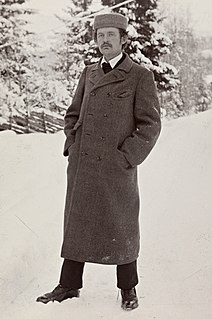A Quote by Edvard Munch
I learned early about the misery and dangers of life, and about the afterlife, about the external punishment which awaited the children of sin in Hell.
Related Quotes
Men, your primary responsibility in your home, after your wife, is you to disciple your own children. And if you don't do it, you're in sin; you are in sin. And if you turn it over to a Sunday school teacher, you are in sin. And you are to be teaching these children more than just stories about animals that went into Noah's ark. You're to be teaching them about God, about radical depravity, about blood atonement, about propitiation, expiation, justification, sanctification; you are to teach your children!
There are people who assume that Christianity is about the afterlife and that our chief problem in this life is that we are sinners who need to be punished and the point of Jesus life is that he took our punishment so we can go to heaven. I write about the problems we get ourselves into by misunderstanding and limiting the way we think about our faith.
I think when we talk about corporal punishment, and we have to think about our own children, and we are rather reluctant, it seems to me, to have other people administering punishment to our own children, because we are reluctant, it puts a special obligation on us to maintain order and to send children out from our homes who accept the idea of discipline. So I would not be for corporal punishment in the school, but I would be for very strong discipline at home so we don't place an unfair burden on our teachers.
I think you should enjoy this life that you are given on this earth because we really don't know what it is in the afterlife. We can definitely prove that this life is this life here because we wake up every day and do the same thing that we do. The afterlife I'm not so sure about. So, I don't understand why you'd want to hurt other people in thinking that you'll go on in the afterlife to have bliss. I just don't understand it.
There are a lot of ways to talk about the life of a photograph. You can talk about the afterlife of a photograph, and in the end I talk about that, with the Richard Prince picture. But mainly, what I dedicated the book to being about was how photographs begin their life, and where they begin it. And they begin it with the photographer's imagination and instinct and experience.
All errors are just ordinary, what extraordinary sin can you commit? All the sins have been committed already. You cannot find a new sin - it is very difficult, it is almost impossible to be original about sin. For millions of years people have committed everything that can be committed. To be thrown in hell for your sins. Now this is too much! you can throw a man into hell for five years, ten years, twenty years, fifty years. If a man has lived for seventy years you can throw him there for seventy years.and that is if you only believe in one life. It is good that they believe in one life.
Have no fear of robbers or murderers. They are external dangers, petty dangers. We should fear ourselves. Prejudices are the real robbers; vices the real murderers. The great dangers are within us. Why worry about what threatens our heads or our purses? Let us think instead of what threatens our souls.
Why do we protect children from life? It's no wonder that we become afraid to live. We're not told what life really is. We're not told that life is joy and wonder and magic and even rapture, if you can get involved enough. We're not told that life is also pain, misery, despair, unhappiness, and tears. I don't know about you, but I don't want to miss any of it. I want to embrace life, and I want to find out what it's all about. I wouldn't want to go through life without knowing what it is to cry.







































